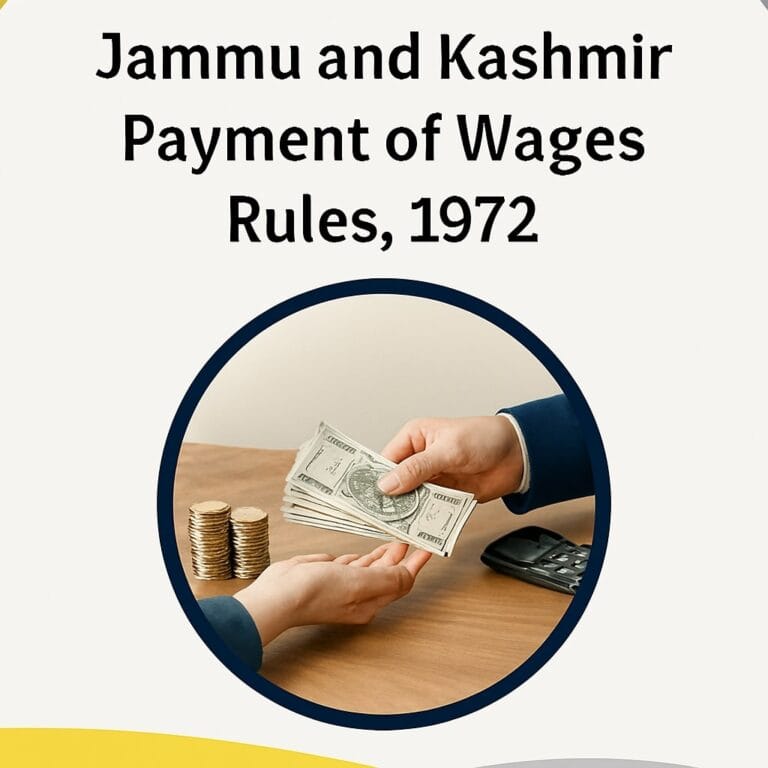
Background
The Jammu and Kashmir Payment of Wages Rules, 1972 were framed under the Payment of Wages Act, 1936 to ensure timely and fair payment of wages to workers employed in factories and industrial establishments across the state. These rules lay down detailed procedures for wage periods, permissible deductions, fines, registers, and mandatory displays to protect employees from arbitrary practices. By specifying formats of registers, returns, and notices, the rules promote accountability, transparency, and compliance with the Act.
Applicability
These rules apply to:
Compliances under the Rule in Accordance with the Act
In every factory and industrial establishment, the employer shall maintain a register of attendance for employed persons in Form XI and shall mark the attendance within one hour after the start of the work in the establishment. The register shall be preserved for 3 years.
In every factory or industrial establishment where deductions for damages or loss are made, the paymaster shall maintain a register in Form I as required under Section 10(2).
A register of wages shall be maintained in Form II in every factory or industrial establishment. It shall contain:
(a) gross wages earned by each employee;
(b) all deductions made with indication of the relevant clause of Section 7(2);
(c) wages actually paid for each wage period.
A notice in Form VI (in Hindi) shall be displayed conspicuously at or near the entrance of each department, specifying the wage rates payable to workers (other than supervisory/managerial staff). Alterations must be dated and preserved for 1 year, and the notice must be available to Inspectors on demand.
The paymaster shall display a notice in English, Hindi, and Urdu at or near the main entrance of the establishment, giving at least one month in advance the dates on which wages are to be paid. Workers absent on payday shall be paid within 3 working days of making a demand.
(b) where the employer is not the sole person imposing fines, a list of appointments empowered to impose fines and classes of employees on whom fines may be imposed.
No fine shall be imposed by anyone other than the employer or a person holding an appointment listed under Rule 17.
Annual return to be filed in Form IV under the Payment of Wages Rules, 1972.
The abstract of the Act and of the Rules made thereunder shall be displayed in Form V as required under Section 25.
The employer, manager, or other responsible person shall be responsible to make payment of all wages under this Act if a contractor or designated person fails to make such payment.
Every person responsible for the payment of wages shall fix wage periods, and no wage period shall exceed one month.
Wages shall be paid before the expiry of:
Where the employment of any person is terminated, wages earned by him shall be paid before the expiry of the second working day from the date of termination.
All wages shall be paid in current coin, currency notes, by cheque, or by crediting the wages into the bank account of the employee.
The total amount of deductions shall not exceed:
i) 70% when deductions are for payments to co-operative societies,
ii) 50% in any other case.
No fine shall be imposed on any employed person except in respect of specified acts and omissions approved by the prescribed authority and displayed in a notice.
A notice specifying acts and omissions for which fines may be imposed shall be displayed in the prescribed manner at the workplace.
No fine shall be imposed without giving the employee an opportunity of showing cause, and procedure prescribed for fines must be followed.
The total fine in any one wage period shall not exceed 3% of wages payable for that period.
No fine shall be imposed on an employed person under 15 years of age.
Deductions may be made only for absence from the workplace where required, or refusal to work without reasonable cause, including strikes without due notice.
Deductions for damage or loss caused by the neglect or default of the employed person shall not exceed the amount of damage or loss and must follow prescribed procedure.
Deductions for advances shall follow prescribed conditions, including recovery schedule, and shall exclude advances for travel expenses.
Every employer shall maintain registers and records of employees, their work, wages, deductions, receipts, and other prescribed particulars, preserved for 3 years.
Penalties & Punishments
(1) Whoever being responsible for the payment of wages to an employed person contravenes any of the provisions of any of the following section, namely, 6 [section 5 except sub-section (4) thereof, section 7, section 8 except sub-section (8) thereof, section 9, section 10 except sub-section (2) thereof, and sections11 to 13, both inclusive, shall be punishable [with fine which shall not be less than one thousand five hundred rupees but which may extend to seven thousand five hundred rupees.
(2) Whoever contravenes the provisions of section 4, sub-section (4) of section 5, section 6, sub-section (8) of section 8, sub-section (2) of section 10] or section 25 shall be punishable with fine which may extend to three thousand seven hundred fifty rupees
Conclusion
The Jammu and Kashmir Payment of Wages Rules, 1972 create a robust framework ensuring that workers receive wages promptly, without unlawful deductions, and with full transparency in wage records. By mandating registers, returns, and public displays of notices, these rules safeguard employees from exploitation and strengthen employer accountability. Adherence to these provisions not only ensures statutory compliance but also fosters trust and fairness in the employer-employee relationship.
Disclaimer: The information contained in this Article is intended solely for personal non-commercial use of the user who accepts full responsibility of its use. The information in the article is general in nature and should not be considered to be legal, tax, accounting, consulting or any other professional advice. We make no representation or warranty of any kind, express or implied regarding the accuracy, adequacy, reliability or completeness of any information on our page/article.